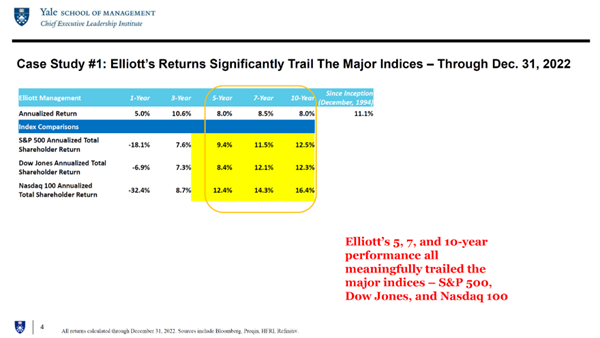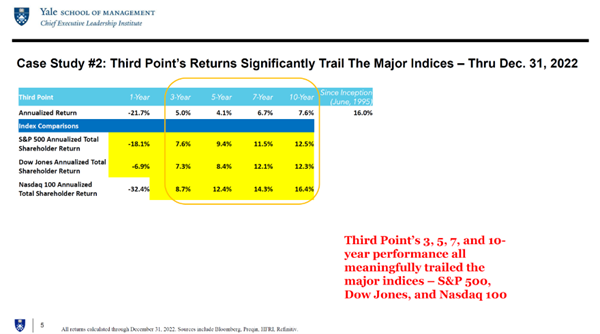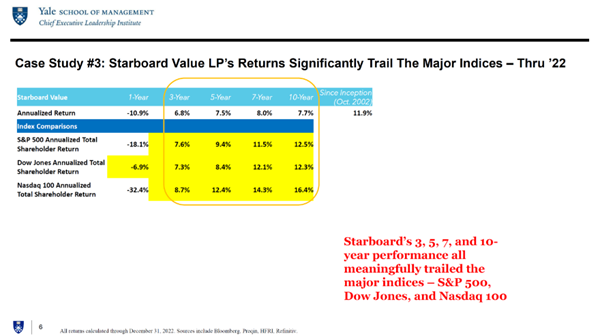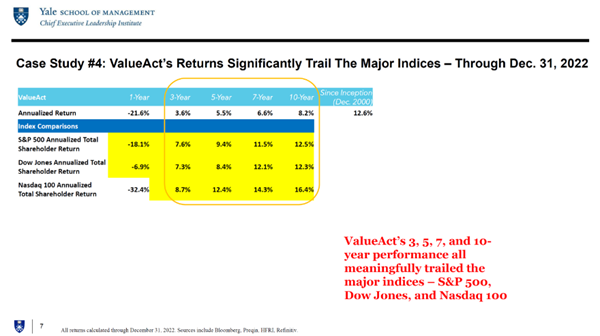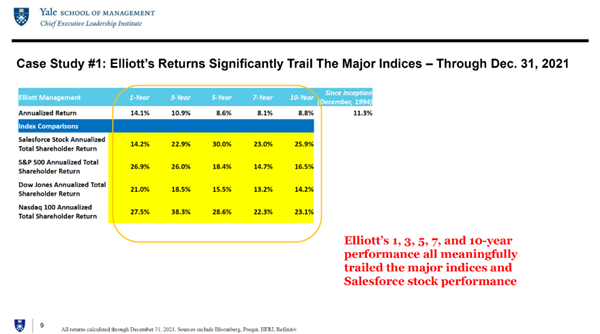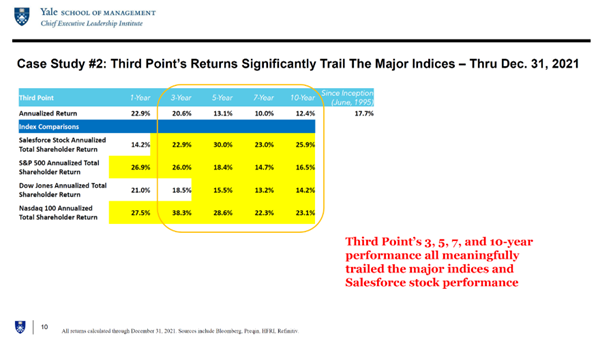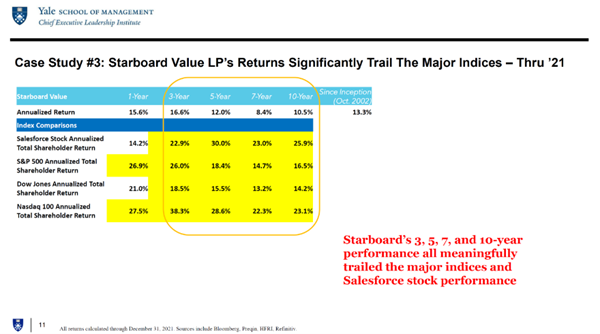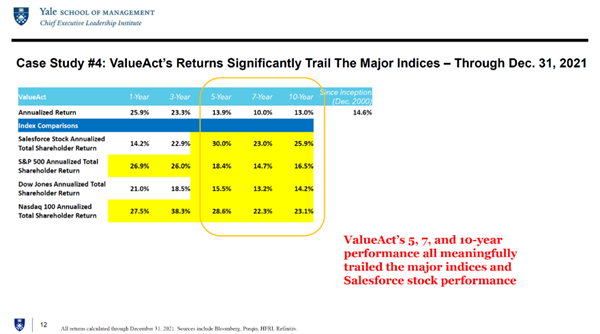
COMMENTARY • SALESFORCE
Activists should sail away from their doomed attack on Benioff’s
Salesforce
BY JEFFREY
SONNENFELD AND STEVEN
TIAN
March
1, 2023 at 10:02 AM EST
|

Salesforce co-founder and CEO Marc Benioff has announced layoffs and a
renewed focus on profitability.
FABRICE COFFRINI—AFP/GETTY IMAGES
|
Over the past six weeks, activist investors have piled on tech giant Salesforce due
to a failed 12-month succession that resulted in the return of founder Marc
Benioff to assume full command amid a drop in stock price. The firms include:
Third Point, Elliott Investment Management, Starboard Value, Value Act, and
Inclusive Capital. However, as The Wall Street Journal concluded,
“It’s not yet clear what all the investors, and particularly Elliott, may want.”
Just last month, Disney
CEO Bob Iger modeled a master class on
how CEOs can turn back activist threats through strategic engagement. Instead of
retreating under the onslaught of Nelson
Peltz’s deceptive attacks, Iger
beat back Trian by simply pointing to genuine facts:
presenting a compelling restructuring and cost-cutting plan while refusing to
concede to false narratives and refuting
the false charge that Disney
overpaid for Fox entertainment.
Our research revealed Peltz’s
own faltering performance, which had been missed by the business press.
No wonder Peltz
was forced to end his
proxy fight before it really began.
A similar story is now playing out at Salesforce. The
facts clearly show that founder and longtime CEO Marc Benioff has created more
long-term shareholder value than
any of the activist funds targeting him–and his strategic pivots to re-orient
Salesforce appear to be taking the wind right out of the activists’ sails.
At this rate, like Peltz last month, these activists are quickly approaching the
point where they have to acknowledge that their sails are set against the tidal
force that is a leaner, profit-focused Salesforce 2.0, which enjoys broad
support from shareholders, suppliers, customers, and Wall Street.
Instead, the activists should learn something from Benioff on shareholder value
creation and not vice versa. When we crunched the numbers, we found that all
four of the major activist funds currently targeting Salesforce–Elliott
Management, Third Point, Starboard Value, and ValueAct–have dramatically
underperformed all the major stock indices, including the S&P 500, the Dow Jones
Industrial Average, and the Nasdaq-100, over the last 3, 5, 7, and 10 years. Our
original, carefully sourced research study found
that through the end of 2022:
-
Elliott Management’s annualized returns trailed the S&P 500, Dow Jones, and Nasdaq 100
on an annualized 5-year basis (8.0% vs. 9.4%, 8.4%, and 12.4% respectively);
7-year basis (8.5% vs. 11.5%, 12.1%, and 14.3% respectively); and 10-year
basis (8.0% vs. 12.5%, 12.3%, and 16.4% respectively).
-
Third Point’s annualized returns trailed the S&P 500, Dow Jones, and Nasdaq
100 on an annualized 3-year basis (5.0% vs. 7.6%, 7.3%, and 8.7%
respectively); 5-year basis (4.1% vs 9.4%, 8.4%, and 12.4% respectively);
7-year basis (6.7% vs. 11.5%, 12.1%, and 14.3% respectively); and 10-year
basis (7.6% vs 12.5%, 12.3%, and 16.4% respectively).
-
Starboard Value’s annualized returns trailed the S&P 500, Dow Jones, and
Nasdaq 100 on an annualized 3-year basis (6.8% vs. 7.6%, 7.3%, and 8.7%
respectively); 5-year basis (7.5% vs. 9.4%, 8.4%, and 12.4% respectively);
7-year basis (8.0% vs. 11.5%, 12.1%, and 14.3% respectively) and 10-year
basis (7.7% vs 12.5%, 12.3%, and 16.4% respectively).
-
ValueAct’s annualized returns trailed the S&P 500, Dow Jones, and Nasdaq 100
on an annualized 3-year basis (3.6% vs. 7.6%, 7.3%, and 8.7% respectively);
5-year basis (5.5% vs. 9.4%, 8.4%, and 12.4% respectively); 7-year basis
(6.6% vs. 11.5%, 12.1%, and 14.3% respectively); and 10-year basis (8.2% vs
12.5%, 12.3%, and 16.4% respectively).
Even more remarkably, these same activists all underperformed nothing other than
Salesforce stock when investment performance is calculated through the end of
2021(around the time of Salesforce’s appointment of a co-CEO who has now left
the company), no matter how one slices and dices it–across 1-year, 3-year,
5-year, 7-year, and 10-year annualized returns. As
our study found:
-
Elliott Management’s annualized returns trailed Salesforce stock, S&P 500,
Dow Jones, and Nasdaq 100 on an annualized 1-year basis (14.1% vs. 14.2%,
26.9%, 21.0%, and 27.5%, respectively); 3-year basis (10.9% vs. 22.9%,
26.0%, 18.5%, and 38.3%, respectively); 5-year basis (8.6% vs. 30.0%, 18.4%,
15.5%, and 28.6%, respectively); 7-year basis (8.1% vs. 23.0%, 14.7%, 13.2%,
and 22.3%, respectively); and 10-year basis (8.8% vs. 25.9%, 16.5%, 14.2%,
and 23.1%, respectively).
-
Third Point’s annualized returns trailed Salesforce stock, S&P 500, Dow
Jones, and Nasdaq 100 on an annualized 3-year basis (20.6% vs. 22.9%, 26.0%,
28.5%, and 38.3% respectively); 5-year basis (13.1% vs. 30.0%, 18.4%, 15.5%,
and 28.6% respectively); 7-year basis (10.0% vs. 23.0%, 14.7%, 13.2%, and
22.3% respectively); and 10-year basis (12.4% vs. 25.9%, 16.5%, 14.2%, and
23.1% respectively).
-
Starboard Value’s annualized returns trailed Salesforce stock, S&P 500, Dow
Jones, and Nasdaq 100 on an annualized 3-year basis (16.6% vs. 22.9%, 26.0%,
18.5%, and 38.3%, respectively); 5-year basis (12.0% vs. 30.0%, 18.4%,
15.5%, and 28.6%, respectively); 7-year basis (8.4% vs. 23.0%, 14.7%, 13.2%,
and 22.3%, respectively); and 10-year basis (10.5% vs 25.9%, 16.5%, 14.2%,
and 23.1%, respectively).
-
ValueAct’s annualized returns trailed Salesforce stock, S&P 500, Dow Jones,
and Nasdaq 100 on an annualized 5-year basis (13.9% vs. 30.0%, 18.4%, 15.5%,
and 28.6%, respectively); 7-year basis (10.0% vs. 23.0%, 14.7%, 13.2%, and
22.3%, respectively); and 10-year basis (13.0% vs. 25.9%, 16.5%, 14.2%, and
23.1% respectively).
Of the other activists in Salesforce, Jeff Ubben’s Inclusive Capital is a new
activist fund that does not yet have a track record. Presidential candidate
Vivek Ramaswamy’s Strive Capital is irrelevant, with a ridiculously puny stake
equivalent to less than .00001% of Salesforce shares–not enough to buy half a
space in the company parking lot. Ramaswamy doesn’t seem to have an argument
other than vague accusations of “wokeism.” If the threshold is now so low for
launching activist campaigns, then perhaps the authors of this essay, who have
modest .000001% Salesforce stakes combined, should consider joining the ranks of
activist investors themselves, as should millions of retail investors!
The dramatic underperformance of these activist funds is even more important
given the strong endorsements Benioff has received from key stakeholders,
including savvy Wall Street analysts, as he lays out a detailed plan focused on
driving profitability and improving margins. Just this week, Goldman
Sachs gave Salesforce a strong “buy” recommendation with
a fresh price target of $310.
“We believe Salesforce is at an inflection point that can vault it into the
upper echelons of highly valued tech companies. We believe Salesforce remains
poised to be one of the most strategic application software companies in the $1
trillion+ TAM cloud industry and is on a path
to $50 billion of revenue growth….we
think revenues and margins have the potential to double in the next 5 years,
potentially quadrupling earnings in steady state. To that end, we remain bullish
on the company’s ability to drive continued y/y operating margin expansion
beyond FY23,” Goldman
Sachs concluded.
“The narrative at Salesforce over recent quarters has shifted from top-line
growth to profitability and efficiency…..we believe Salesforce has significant
margin expansion potential ahead, and we believe Salesforce can become a 30%+
plus operating margin business over the next three years and drive
better-than-expected free cash flow growth at a CAGR of 25%,” analysts
at William Blair wrote,
echoing similarly enthusiastic fresh “buy” recommendations from Morgan
Stanley, Bank
of America, Wells
Fargo,
and Evercore.
Salesforce’s customers are also enthusiastic, with 92% deriving revenue from
Salesforce’s vaunted sales cloud and reporting high satisfaction ratings in
a survey by Guggenheim.
Just last year, Benioff
was selected by his CEO peers as Chief Executive’s CEO of the Year.
If precedent is
any guide, Elliott’s vaunted tech activist Jesse Cohn knows when a company’s
leadership has deftly taken the wind out of the activists’ sails. This is
clearly the case. When all is said and done, perhaps Benioff should offer
lessons on value
creation to
activist investors.
Jeffrey Sonnenfeld is the Lester Crown Professor in Management Practice and
Senior Associate Dean at Yale School of Management. Steven
Tian is the director of research at the Yale Chief Executive Leadership
Institute.
The opinions expressed in Fortune.com commentary pieces are solely the views of
their authors and do not necessarily reflect the opinions and beliefs of Fortune.
© 2023 Fortune Media IP
Limited. |

